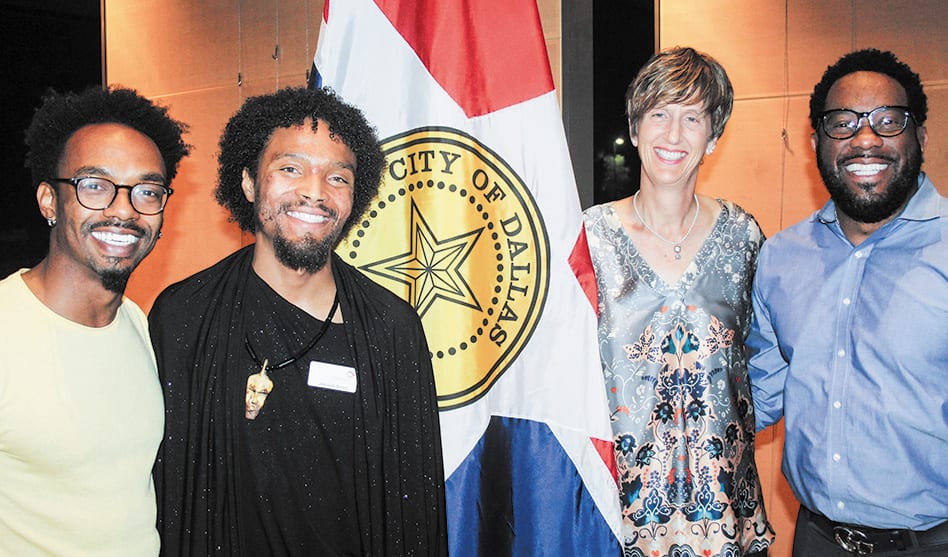From left: PJ Moton, Jalenzski Brown, Cece Cox and Kirk Myers.
After a three-workshop series, planners have scheduled social events to carry on the work begun in discussions addressing race and the LGBT community
DAVID TAFFET | Senior Staff Writer
taffet@dallasvoice.com
A three-session workshop on racial healing in the LGBT community wrapped up this week with a three-hour conversation at Dallas City Hall.
PJ Moton of Abounding Prosperity and Jalenzski Brown of Resource Center moderated the discussion. Resource Center CEO Cece Cox and Abounding Prosperity CEO Kirk Myers joined the panel for this week’s final session.
Although the series is concluded, everyone attending agreed the discussions should continue, and a variety of events are already planned or being discussed.
The first session was “unpacking and addressing” the issues. Brown said it was alright for the discussion to be uncomfortable in what he labeled a brave space rather than a safe space.
Among the issues participants brought up were barriers to getting into the bars, tokenism and attraction.
Getting into the bars has been an issue in the community for decades. At one time, people of color were required to show three forms of ID just to get in the door. Women were turned away from men’s bars if they were wearing open-toed shoes. That problem cropped up recently when singer and reality TV star Tamar Braxton was refused entry to JR.’s Bar & Grill because of what she was wearing.
Attraction, or what Brown called sexual fetish, manifests itself in many different ways. Some people described experiences where someone of a different race would have sex with them, but wouldn’t be seen in public with them. Other talked about dating profiles that excluded all people of another race or their own race.
Brown described tokenism as “including people of color when you need to check off a box, but not empower them.”
“Hope: Creating Solutions” was the theme to the second workshop.
Brown said attendees broke up into groups to discuss topics such as civic engagement and power structures. He said they were looking for ways to get people involved in the election process that included everything from getting out the vote to running for office.
“Creating social spaces and getting to know one another,” was a way Brown said they hoped to begin addressing segregation in the LGBT community. He said that LGBT youth of color are overwhelmingly bullied and even more likely than other LGBT youth to be homeless.
“Name and gender marker changes for transgender people of color is harder,” Brown said, because of legal and financial barriers.
Brown said he’d like to bring back a Dallas LGBT community institution that trained leaders and brought people together in the 1990s and early 2000s — Leadership Lambda. That group brought together talent from around the community to train people to write grants and learn how to fundraise for their organizations. It taught about the challenges different groups overcame and presented ways various groups could work together.
In the third session, Cox suggested one way to bring people together was to unite on issues overlapping different groups. Cox said she is always looking to answer the question, “What do we have in common?” She suggested groups work together on issues like access to healthcare or gun violence and seek solutions together.
Moton said when people of color are brought into a group, he’s looking for meaningful involvement that includes taking leadership roles.
Former Dallas Mayor pro tem John Loza was glad the conversation was going on, but asked the group at the third workshop, “How do we reach people who aren’t here, but should be?”
“The discussion needs to continue,” Brown said after the conclusion of the series.
He said they’ve planned several social events and are scheduling more to keep the discussion going. DFW Pride Happy Hour on May 11 and a town hall meeting with Dallas police on May 24 both take place at Resource Center. Brown also suggested a potluck might be a good summer activity.
“We need to grow this to see if people want to continue having this conversation,” he said.
















